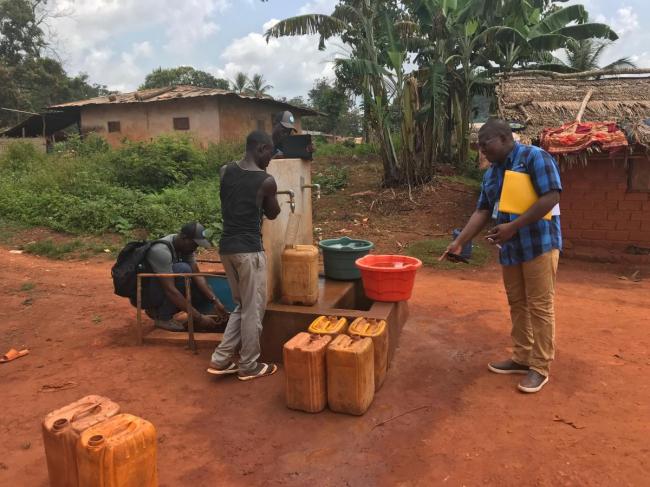Technical assistance mission for the sustainable development of drinking water services in Central African Republic.
Published on: 18/10/2021
This article has been written by Hilaire Dongobada
Water for Good (WFG) and IRC have conducted a technical assignment in the Central African Republic (CAR). The objective was to support WFG's ambition to achieve universal access to water and sanitation in region 2 (starting with the Mambéré Kadéi prefecture) and to support the national ambition to improve water and sanitation services in the whole republic. Water for Good has been working in the Central African Republic since 2004 to provide drinking water services to its people.

From left to right: Crépin Mavoungou Makapou (WFG), a water user and Hilaire Dongobada (technical advisor IRC/WFG)
The four objectives of the assignment were:
The technical assistance mission took place from August 2019 to April 2021 and included remote consultancy support, proposals for management, collaboration tools and three face-to-face field missions.

From left to right : Crépin Mavoungou Makapou (WFG), Noufé Sanza (WFG), Hilaire Dongobada (technical advisor IRC/WFG) and the Regional Director of Energy and Hydraulic Resources, Region 2
The main results of this technical assistance are:
From this first period of technical assistance, we can note that all the actors are on board and that there is confidence in the initiatives of Water for Good. On this basis it is possible to start the implementation of the 2030 objectives in CAR. To this end, the partnership between WFG and UNICEF is the backbone on which a strengthened WASH system in the republic can be built.
In addition, it is important for WFG to continue to strengthen its own structure in order to meet the new challenges and requirements to become a hub, both at local and national level. The reorganisation and strengthening of local staff remain essential.
Finally, although there is a great deal of willingness on the part of the various actors to collaborate, change takes time and will require a great deal of investment in time and energy from staff who must be equipped to deal with it. The challenge can be met, provided that all local staff believe in it and have the full support of international staff.
A new phase of technical assistance may be needed to continue to support the momentum of WFG, which has been more or less disrupted by the onset of the COVID-19 pandemic and the political instability and deteriorating security environment in the country since the end of 2020.